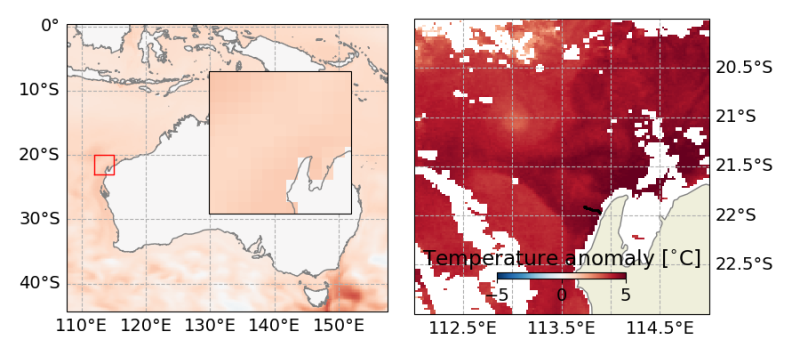Higher Degree by Research Application Portal
| Title | Quantifying ocean heat transport pathways at Ningaloo in a changing climate |
|---|---|
| Supervisor | Prof Nicole Jones |
| Dr Matt Rayson | |
| Course | Doctor of Philosophy |
| Keywords | Physical oceanography |
| Marine Heatwaves | |
| Voyage | |
| Research area | Earth Sciences |
| Project description |
The oceans have absorbed more than 90% of the excess heat from radiative forcing caused by excess atmospheric CO2, leading to both an ocean warming trend and short-term extreme events, called marine heatwaves. For example, during the summer of 2024-25, the Ningaloo Coast and the adjacent continental shelf to the north experienced a severe marine heatwave that resulted in widespread coral bleaching and significant fish mortality. The severity of this event was substantially underestimated by seasonal forecasts. As with most marine heatwaves, large-scale climate drivers initiated the event, however, the spatial variability in extreme sea temperature was governed by localised oceanic processes. There is an urgent need to plan and adapt for increasingly prevalent, high-risk marine heatwave events in the coastal ocean, but we require reliable prediction of the physical processes that control the transport of heat at fine scales. These predictions will help identify both regions at high risk as well as thermal refugia. In this project, you will quantify heat transport off the Ningaloo Coast- the world’s largest fringing coral reef and a UN World Heritage site - which is linked to the deep ocean by a narrow continental shelf. Here warming ocean temperatures can be countered by processes such as breaking internal waves, air-sea heat transport, transient upwelling and eddies. The relative importance of each source of cooling is unknown. You will participate in a 35-day voyage off the Ningaloo Coast on the RV Investigator in March-April 2026 where we will take new observations that you will use to quantify the rates of heating and cooling driven by different ocean and atmospheric processes to inform management decisions at Ningaloo. |
| Opportunity status | Open |
| Open date | 21 Jul 2025 |
| Close date | 31 Oct 2025 |
| School | Graduate Research School |
| Contact | Prof. Nicole Jones : nicole.jones@uwa.edu.au |
| Additional information | Essential requirement:
This research will be based at the Indian Ocean Marine Research Centre (School of Earth and Oceans and UWA Ocean Institute) at the University of Western Australia (Perth, Australia) within a dynamic team of students and researchers specialising in physical oceanography, machine learning and statistics. |
| Course type | Doctorates |
| Description | The Doctor of Philosophy (PhD) is a program of independent, supervised research that is assessed solely on the basis of a thesis, sometimes including a creative work component, that is examined externally. The work presented for a PhD must be a substantial and original contribution to scholarship, demonstrating mastery of the subject of interest as well as an advance in that field of knowledge. Visit the course webpage for full details of this course including admission requirements, course rules and the relevant CRICOS code/s. |
| Duration | 4 years |
Guidance
Send your most recent academic transcript, CV and a cover letter to Prof Nicole Jones (nicole.jones@uwa.edu.au) before 15/09/2025.
Bachelor Honours Degree (or comparable) - or - Master Degree - that contains a significant research component.
Scholarships
Available scholarships in this opportunity.
Quantifying ocean heat transport pathways at Ningaloo in a changing climate
